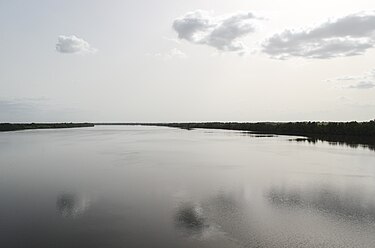Geba River
This article needs additional citations for verification. (May 2016) |
| Geba | |
|---|---|
 Geba River in Guinea-Bissau | |
 Map of Senegal, Guinea and Guinea-Bissau with the catchment area of Geba (light green) | |
| Location | |
| Countries | |
| Physical characteristics | |
| Source | |
| • location | Fouta Djallon highlands, Guinea |
| Mouth | |
• location | Atlantic Ocean |
• coordinates | 11°43′20″N 15°38′40″W / 11.72222°N 15.64444°W |
| Length | 255 km (158 mi)[1] |
| Basin size | 12,359.6 km2 (4,772.1 sq mi)[1] |
| Discharge | |
| • location | Near mouth |
| • average | (Period: 1979–2015) 6.91 km3/a (219 m3/s)[2] (Period: 1971–2000) 127 m3/s (4,500 cu ft/s)[1] |
| Basin features | |
| River system | Geba River |
| Tributaries | |
| • left | Bidigor, Colufe, Undauma |
| • right | Anambé |

The Geba (French: Rivière Geba, Portuguese: Rio Geba) is a river of West Africa that rises in the northernmost area of Guinea in the Fouta Djallon highlands, passes through southern Senegal, and reaches the Atlantic Ocean in Guinea-Bissau. It is about 550 kilometres (340 mi) in total length.[3]
In Senegal, the river is locally known as the Kayanga.
Its tributary the Colufe River joins the Geba at Bafatá. After passing by Geba town and Bambadinca, the river broadens into a wide estuary below Xime (where it is joined by the Corubal River), with a total width of about 15 kilometres (9.3 mi) at Bissau.[3] The estuary widens further as the river flows into the Atlantic, forming the Bissagos Islands archipelago.
The Geba River, along with the Corubal River, drains the Bafatá Plateau. It also drains the Gabú Plain, along with the Farim River (also known as the Cacheu River), and their tributaries.[4]
It has long been an important trade route connecting into the interior; it is accessible to 2,000-ton ships some 140 kilometres (87 mi) in, and shallow-draft vessels even further.
References
[edit]- ^ a b c "North Africa-West Coast".
- ^ "River Basins". Archived from the original on 17 January 2024. Retrieved 29 January 2024.
- ^ a b "Golden Sediments from Geba River, Guinea Bissau". Earth Snapshot. Chelys. Archived from the original on 27 September 2020. Retrieved 8 October 2015.
- ^ Pélissier, René. "Guinea-Bissau". Encyclopædia Britannica. Retrieved 8 October 2015.
Bibliography
[edit]- Salif Diop, La côte ouest-africaine. Du Saloum (Sénégal) à la Mellacorée (Rép. de Guinée), ORSTOM, Paris, 1990, p. 380
